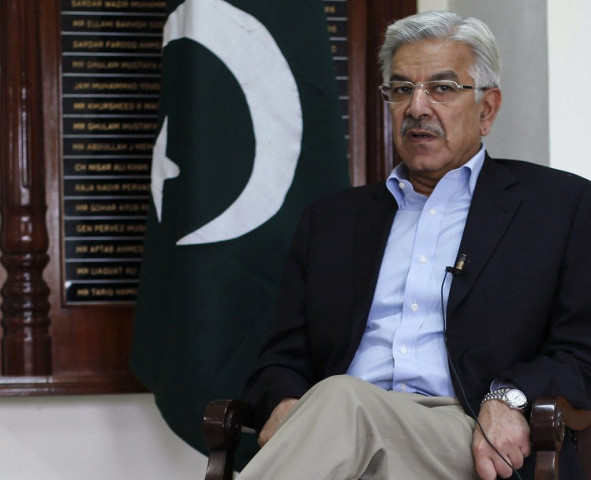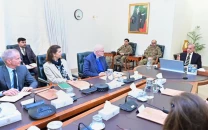Water issues: Pakistan, India back at the negotiating table
Khawaja Asif welcomes talks but refuses to speculate about the outcome

Defence Minister Khawaja Asif. PHOTO: REUTERS
The two-day talks of Indus water commissioners of the two countries marked the first formal engagement between the arch rivals since relationship between them nosedived in September last year after an attack on an Indian military base in disputed Himalayan state of Kashmir.
India under the 1960 Indus Waters Treaty (IWT) is bound to hold such meetings with Pakistan. But the current meeting of the Indus water commissioners is significant in the sense that Premier Modi last year threatened to revoke the water accord with Pakistan.
Delhi returns to the table after water war threats
The bilateral talks were halted in March 2015 at the time when both the countries were on the table to take up issues like India’s Kishanganga and Ratle power projects. However, on Monday India’s Indus Water Commissioner P K Saxena revived the talks with his Pakistani counterpart Mirza Asif Beg.
Addressing a news conference in connection with the meeting, Minister for Water and Power Khawaja Asif welcomed the Indian decision to send its commission to Pakistan but said, “We will defend our rights with full zeal and vigour”.
“It is a happy augury that of late India has come back to the negotiating table at the commission level to re-launch the process of peaceful talks. I am happy to announce that the process of bilateral talks has been started on the IWT following efforts by Pakistan,” the minister said.
He said Pakistan had always been struggling to keep the dialogue process continue in light of the IWT but the other side was not inclined to keep the ball rolling for a peaceful settlement of issues.
“Implementation and safeguard of this treaty is in the best bilateral interest,” he added. “The sanctity of this agreement and settlement of issues through this mechanism is beneficial for both the countries.” Asif said the commission would take up for discussion India’s three proposed power projects – Pakal Dul, Lower Kalnai and Maihar. “We want that India should share designs of the three proposed projects and if the designs hurt Pakistan’s interests then objections will be raised at the appropriate forum. It is our right,” he added.
The minister said the secretary level talks on Ratle power project would be held next month – on April 11-13 – in the United States under the aegis of the World Bank. During the upcoming talks, Pakistan would be in a position to protect its rights on the Ratle hydroelectric project
“The Ratle power project is in the initial stages and Pakistan has already expressed reservations on its design. Pakistan has already taken up both the issues at the World Bank level,” he said. “Pakistan’s stance has not been negated at any level.”
Asif said Pakistan opted for international arbitration following the failure of the secretary-level talks on both the issues held in India in last July. Pakistan has been urging for implementation of the arbitration court’s decision on the issue of construction of Kishanganga dam on the Jhelum River.
Indus Waters Treaty: Held ‘constructive’ talks with Pakistan: WB chief
India insists on appointment of a neutral export but Pakistan’s stand is that issues should be settled through the International Court of Arbitration. “Due to this impasse, the US intervened at the highest level and a World Bank delegation also visited Pakistan with the aim to pacify the fueling situation,” he added.
The minister avoided accusing any formal Pakistani official for not properly pursuing the case of Kishanganga hydroelectric project, saying he did not want to start another controversy for media.
To another question, the minister said he would not speculate the talks on water would ultimately lead to the resumption of composite dialogue. “Nothing could be speculated about the outcome of the talks,” he said. [WITH ADDITIONAL INPUT BY APP]
Published in The Express Tribune, March 21st, 2017.



















COMMENTS
Comments are moderated and generally will be posted if they are on-topic and not abusive.
For more information, please see our Comments FAQ